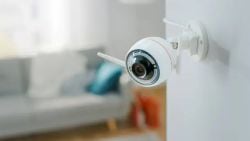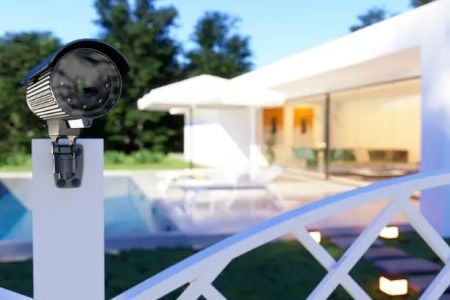A lot of us are thinking about upgrading our CCTV at home, but the big question is always the same – wired vs wireless CCTV, which one’s better? Both have their perks and can be great for different needs. In this article, we’ll explain the differences between wired and wireless CCTV systems, so you can choose the right one to protect your property.

Editor
Mae An NG chevron_right
Table of Contents
What’s the Difference - Wired vs Wireless CCTV
When setting up your home or office security system, one of the first things to consider is whether to go for a wired or wireless CCTV system. Both have their own strengths and are suitable for different situations, depending on your budget, location, and security needs. Wired CCTV systems have been around longer and are known for their stable connection and reliability. On the other hand, wireless CCTV systems are becoming more popular due to their easier installation and flexibility, especially if you want something modern and less messy.
So, what exactly sets them apart? Let’s dive into it!
Wired CCTV System

The CCTV cameras connect with wires to a recording device (like a DVR or NVR). These wires send the video. They also often give power to the cameras. Wired CCTV is a popular choice for many homes and businesses in Malaysia. Here’s why:
Advantages:
- Very Stable Signal: Because they use wires, the video signal is very strong. You will not have problems like slow Wi-Fi. The picture is always clear.
- Harder to Hack Remotely: It is hard for others to steal your video signal from outside. They would need to cut the wires.
- No Need to Worry About Batteries: Cameras get power directly from the wires. So, you do not have to worry about batteries running out when you are away.
- Good for Large Areas: If you have a big house or want many cameras, a wired system is usually more reliable.
Disadvantages:
- Installation Can Be Difficult: You need to pull wires and drill holes in walls. This can be hard. You often need a professional to install it. The installation cost can also be high.
- Not Flexible: Once installed, it is hard to move the cameras. You would need to run new wires.
- Visible Wires: If you do not hide the wires well, they can look messy.
Wireless CCTV System

Wireless CCTV systems, as the name suggests, do not use many wires. Wireless CCTV is getting more popular. It’s easy and modern. Here’s what makes it great:
Advantages:
- Very Easy to Install: You do not need to drill walls. Just place the camera, connect to Wi-Fi, and you are done! You can do it yourself.
- Flexible Placement: Want to move a camera? Unplug it and put it in a new spot. Easy! This is good for people who rent.
- Looks Neat: No messy wires. Your home looks tidy.
- Many Smart Features: They often come with an app. You can watch live video from your phone. They may have motion detection and two-way audio (you can talk to people at home).
Disadvantages:
- Depends on Wi-Fi: If your home Wi-Fi is slow or often has problems, the CCTV picture might freeze or not connect.
- Can Have Interference: Other Wi-Fi signals or even a microwave oven can disturb your camera's signal.
- Small Hacking Risk: If you do not use a strong Wi-Fi password, there is a small risk someone might try to access it. But today, their security is much better.
- Batteries (For Battery Models): If you use battery-powered cameras, you need to charge them often. If not, the camera will stop working.
- Cameras Can Be a Bit More Expensive: For good models, the price per camera can be a bit higher than for wired cameras.
Which One Should You Choose?
Choosing between a wired and wireless CCTV system really depends on your needs, your space, and how much flexibility you want.
If you’re setting up a permanent security system for your home or office and don’t mind a bit of wiring work, a wired CCTV system is a solid choice. It offers a stable connection, doesn’t rely on Wi-Fi, and is generally harder for intruders to tamper with. It’s perfect for larger homes, business premises, or places where you want 24/7, reliable surveillance.
On the flip side, if you’re renting, moving often, or just prefer a cleaner, easier setup, go for wireless CCTV. It’s more flexible, easier to install, and great for smaller homes or condos. Just make sure your Wi-Fi connection is strong!
In short, go wired for long-term, heavy-duty use, and wireless if you want simplicity and portability.
Extra Tips
These tips can help you avoid surprise costs or setup headaches, making sure your CCTV investment is worth it!
Check Your Internet Speed (for Wireless Systems)
Wireless CCTV systems rely heavily on Wi-Fi. If your internet is slow or unstable, your footage might lag or fail to upload to the cloud. Use at least a 10Mbps upload speed for smooth streaming.
Consider Power Supply
Even wireless CCTV cameras still need power, usually through a power cable or rechargeable battery. If you’re placing them outdoors, think about weatherproof cables or solar panel options for consistent power.
Think About Data Storage
Wired systems often come with a DVR/NVR and large storage drives. Wireless systems might use cloud storage or microSD cards. Compare costs and privacy levels; some cloud plans have monthly fees.
Look at Mobile App Features
Wireless cameras usually come with mobile apps for remote viewing. Check if the app supports real-time alerts, two-way audio, or motion detection zones.
Future Expansion
Planning to add more cameras later? Make sure your system (especially wireless) supports multiple devices without affecting performance.
Final Thoughts

Choosing between wired vs wireless CCTV depends on what you need. Wired CCTV gives you a stable and strong security connection, but installation is a bit hard. Wireless CCTV is easy to install and flexible, but you need good Wi-Fi.
No matter which one you choose, make sure you pick a reliable brand to keep your home safe.
Check out the best CCTV options in Malaysia today!
